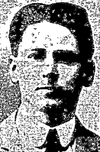Harry T. Bagley
Harry Taylor Bagley (December 23, 1874 – January 20, 1919) was an American attorney and politician in the state of Oregon. A native of Ohio, he was raised in Washington County, Oregon, where he practiced law and was a local official. He also served as a two-term mayor of Hillsboro, the county seat, and under his administration the city's public works were modernized and roads paved for the first time.
Harry Taylor Bagley | |
|---|---|
 | |
| Mayor of Hillsboro, Oregon | |
| In office December 5, 1910 – January 4, 1915 | |
| Preceded by | A. B. Bailey |
| Succeeded by | William N. Barrett |
| Personal details | |
| Born | December 23, 1874 Canton, Ohio |
| Died | January 20, 1919 (aged 44) Hillsboro, Oregon |
| Nationality | American |
| Political party | Republican |
| Spouse(s) | Cora M. Rhea Lamkin |
| Profession | Lawyer |
Early life
Harry Bagley was born on December 23, 1874, in Canton, Ohio, to William and Sarah Bagley (née Robinson).[1] The couple had wed in England in 1866 before immigrating to the United States that same year.[1] Harry was one of six children born to the English natives, which included William H., George, Nellie, and Lillie.[1] Harry lived in Canton until 1885 when the whole family moved west to Oregon, where his father farmed.[1] Harry continued his education at the local public schools in Washington County, and at the county seat, Hillsboro.[2] He then attended high school in neighboring Portland beginning in 1890.[2] In 1894, he started reading law at the law firm of Ellis and Lyons in Heppner, Oregon.[2] William R. Ellis had served in congress and T. R. Lyons served as a judge for the Federal Court for the Alaska Territory.[1] Bagley was admitted to practice law in Oregon in July 1897.[2] At this time he was also a registered insurance agent in both Hillsboro and Heppner.[3] On January 18, 1899, he married Cora M. Rhea, a native of Morrow County in Eastern Oregon, and the daughter of a banker in Heppner.[1][2]
Legal career
That year he began practicing law in Washington County, Oregon, and beginning in August he also served as a deputy district attorney for the county, a position he would continue to hold until August 1900 under district attorney T. J. Cleeton.[2] Bagley served as the justice of the peace in Hillsboro, Oregon from 1902 to 1908, and later served as the bankruptcy referee for the county.[2]
Bagley worked for Clackamas County, Oregon in a lawsuit in 1915 against the county over a contract with a detective hired to investigate a murder case.[4][5] Meanwhile, brother George helped represent the detective suing the county, with the detective winning the lawsuit and $2,000.[4][5] In 1919, he, along with Samuel B. Huston, worked for defendant Rosa Merlo on her appeal to the Oregon Supreme Court of her manslaughter conviction for killing her husband.[6] Merlo had originally been convicted at trial in Hillsboro, where Harry's brother George served as the judge.[6]
Political career
On December 2, 1901, Bagley became the recorder for the city of Hillsboro, and held that position until December 1, 1907.[7] A Republican, he was elected as the mayor of Hillsboro in December 1910, and served in that position from December 5, 1910 until January 4, 1915.[2][7][8] Bagley had run unopposed on a progressive ticket with a promise to start paving streets in Hillsboro, and garnered 326 votes out of 329 votes cast in the election.[9]
In May 1911, he signed six ordinances that ordered the paving of 12 blocks of streets in the central business district.[10] Bagley led the official Hillsboro welcome to the arrival of the Portland, Eugene & Eastern electric railroad in January 1914.[11] Also while mayor he appointed his brother George, and others, to a special water commission to study how to replace the city's inadequate water supply system.[12] The commission recommended a gravity-run system that was estimated to cost $131,000 to build.[12] Also during his tenure, the city improved their sewer system.[13] He also served as a member of the Hillsboro school board.[1]
Later life and death
In civic affairs, he was a member of the Knights of Pythias.[1] During World War I he was a member of the Council of National Defense.[13] Harry T. Bagley died on January 20, 1919, of pneumonia during the 1918 flu pandemic in Hillsboro at the age of 44.[13] He was buried at the Hillsboro Pioneer Cemetery.
References
- Gaston, Joseph; George H. Himes (1912). The Centennial History of Oregon, 1811-1912. Vol. 2. S.J. Clarke Publishing Co. pp. 845–846.
- Colmer, Montagu, and Charles Erskine Scott Wood. 1910. History of the Bench and Bar of Oregon. Portland, Or: Historical Pub. Co. p. 83.
- "The Spectator Insurance Yearbook". New York, N.Y.: Spectator Company. 1898: 522. Cite journal requires
|journal=(help) - "Clackamas Court Sued at Hillsboro". The Oregonian. April 27, 1915. p. 11.
- "Clackamas Loses $2000 to Sleuth". The Oregonian. April 28, 1915. p. 4.
- State v. Merlo, 182 P. 153, 154, 155 (1919)
- City Council: City Councilor History. Archived 2011-09-12 at the Wayback Machine City of Hillsboro. Retrieved on January 4, 2011.
- Mayors: City of Hillsboro. The Hillsboro Argus, October 19, 1976.
- "Hillsboro votes good roads". The Oregonian. December 6, 1910. p. 5.
- "City to spend $150,000". The Oregonian. May 22, 1911. p. 3.
- "New electric line to valley opened". The Oregonian. January 18, 1914. pp. 1, 13.
- "Hillsboro plant urged". The Oregonian. January 24, 1912. p. 7.
- "Hillsboro ex-mayor dies". The Oregonian. January 22, 1919. p. 10.